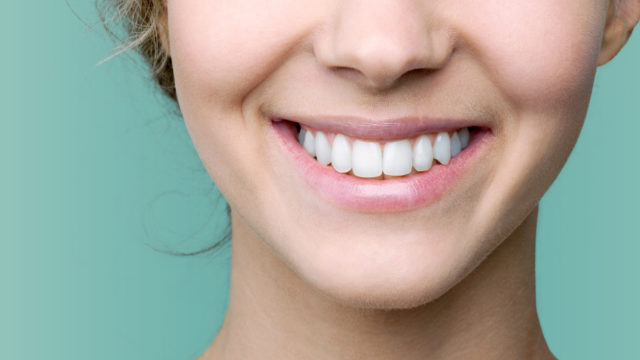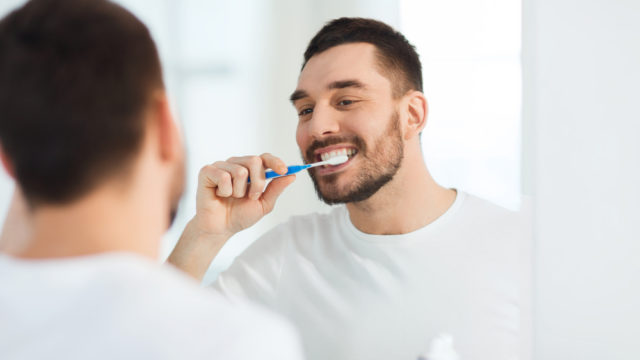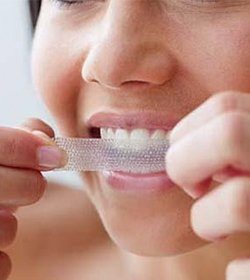Your smile is the first thing people notice, so it’s only natural to want a bright, white smile. If you have less than white teeth, you may not feel as confident in your smile. That’s why teeth whitening can have a lasting impact.
But, with so many products on the market, how do you know which is right for you? Should you see your dentist for professional teeth whitening services, or is an over-the-counter whitening toothpaste better? Let’s talk about what causes discoloration, the common teeth whitening methods, and what dentists recommend.
What Causes Tooth Discoloration?
It’s natural to look for ways to prevent discoloration and avoid teeth whitening services altogether. The most common causes of tooth discoloration are:
- Food and drinks, like coffee, tea, and things with tannins in them
- Smoking and tobacco use
- Antibiotics during childhood
- Exposure to high levels of fluoride or tetracycline during adolescence
- Genetics can affect tooth color
- Aging causes teeth to darken
As you can see, it’s possible to prevent some staining and discoloration by cutting out certain things, but it’s impossible to completely preserve the brightness of your teeth. At some point, you may need to look into teeth whitening services to refresh your smile!
Common Teeth Whitening Methods
Knowing that you can’t prevent all discoloration may help you choose to pursue solutions, but then you run into several options and a mountain of information on each. Paring down your choices to find the best teeth whitening option for your smile may seem daunting, but it helps to understand the differences and any related risks.
1. Whitening Toothpaste
One of the most common options for brightening a smile is whitening toothpaste. Most major toothpaste companies have at least one product that promises to brighten your smile. The truth is that they only remove surface stains, meaning they can’t help with discoloration that runs deeper, including the natural color of your teeth.
Whitening toothpaste is easy to find and generally safe for daily use. They can use one of three methods to remove surface stains:
- Mild abrasives, like magnesium carbonate, remove surface stains.
- Diluted hydrogen peroxide is a common whitening agent, though it can cause mild sensitivity for some people.
- Carbamide peroxide can achieve similar but faster results than hydrogen peroxide.
Whitening toothpaste can be effective if you only hope to remove surface stains. Make sure you choose one that’s approved for daily use by the American Dental Association (ADA).
2. Teeth-Whitening Strips
Teeth-whitening strips are another popular product that you can purchase over-the-counter. The at-home whitening solution uses chemicals to remove stains and brighten your teeth.
Whitening strips are generally safe, but some people develop sensitivity, tooth pain, and gum irritation, especially with overuse. The chemicals can also exacerbate gum inflammation and cavities.
Additionally, if you have fillings, crowns, or bridges made of porcelain or ceramic, you may have some issues. First, they may not match your natural teeth after using whitening strips. In other cases, the chemicals seep under fillings and crowns and cause sensitivity.
3. Charcoal Whitening
Over the past several years, there’s been an uptick in charcoal whitening products. Rest assured, it’s not the charcoal that you use to grill; it’s a unique blend of substances, including bits of shell, coal, peat, bone char, and more. While it may not sound appetizing, charcoal draws out toxins and debris, making it a viable teeth whitening option.
Brushing activated charcoal on your teeth attracts food debris, dirt, and tartar like a magnet. As long as you brush gently and rinse thoroughly, you could remove the stains from your teeth.
While charcoal whitening products can remove stains from your teeth, they can’t alter the natural color of your teeth. Additionally, they aren’t substitutes for regular toothpaste and should only serve as an occasional substitute.
4. Teeth Whitening Gels
Teeth whitening gels involve applying a clear substance to your teeth to remove stains. The gel is similar to what they use on whitening strips, but it can be applied with a small brush, syringe, or custom trays that fit over your teeth. It’s usually done at home, though you can get the treatment from your dentist.
Since teeth whitening gels come in different strengths, it’s a good idea to consult your dentist to get the proper one for your teeth. Your dentist can also explain what to expect in terms of outcome and potential side effects.
5. Laser Whitening
Laser whitening can only be done by trained dental professionals, but you can expect precise results. Using a soft laser, dentists can achieve impressive results in less than an hour. It can even be done on one or two teeth, unlike other options that aren’t as precise.
Though laser whitening is the most expensive option, it’s also the most precise and longest-lasting solution. No whitening treatment lasts forever, but you can enjoy laser whitening results for anywhere from six months to a few years!
What is the Most Effective Way to Whiten Teeth?
It depends on the state of your teeth and what you hope to accomplish. If your tooth discoloration is due to drinking a lot of coffee or tea, you may get acceptable results with over-the-counter options. However, if your natural teeth are slightly yellow, whitening strips and toothpaste won’t get you bright, white teeth.
It’s important to note that tooth-colored restorations won’t change color with whitening treatments, but you can get excellent results with natural teeth.
What Do Dentists Recommend to Whiten Teeth?
The ADA notes that most teeth whitening options deliver results, but they can also cause tooth sensitivity and gum inflammation. It is recommended that you speak with your dentist to find the best teeth whitening solution to meet your needs.
At Jefferson Dental & Orthodontics, our teams offer two options for teeth whitening. We handle laser whitening in our offices if you want faster, more precise results.




